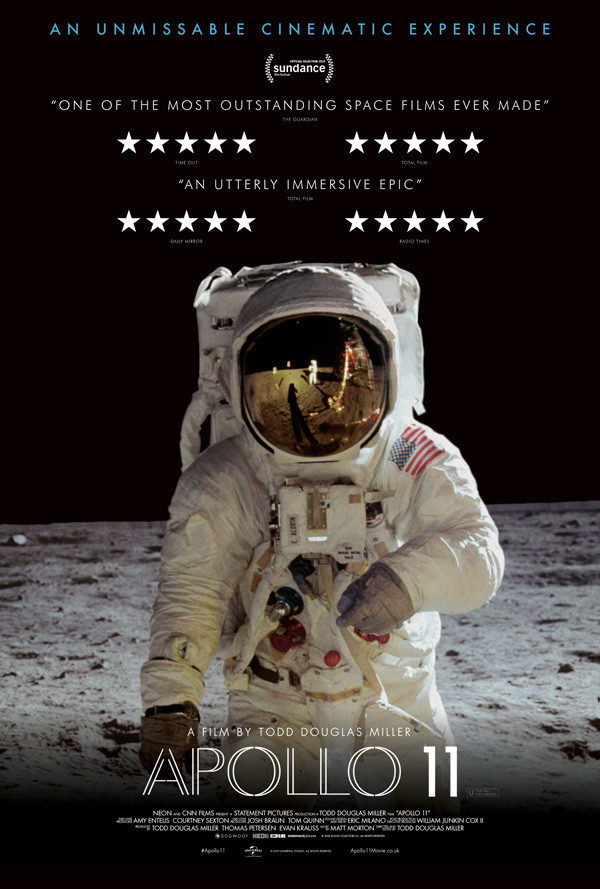Apollo 11, 2019.
Directed by Todd Douglas Miller.
Starring Neil Armstrong, Buzz Aldrin and Michael Collins.
SYNOPSIS:
A documentary that brings to life a selection of archive footage, including some that has never been seen before, to explore the 1969 mission to put men on the moon.
Coming less than a year after Damien Chazelle’s heavyweight biopic First Man, which told the story of Neil Armstrong’s journey to the moon through the brooding eyes of Ryan Gosling, it might seem like there’s not much room for a straight documentary about the 1969 mission. Step forward Apollo 11, though, which feels like an immediately essential portrait of one of the most remarkable achievements in the history of humanity. As the voiceover of a news anchor says at the time of the launch, this marked “the beginning of mankind’s greatest adventure”.
For starters, the movie is a feat of technical innovation. Much like last year’s excellent Peter Jackson documentary They Shall Not Grow Old, which brought the First World War to vivid life, director Todd Douglas Miller tells his story entirely through meticulously restored archival material. There’s no recorded narration and not a single talking head, with the story told via contemporary voice recordings and news reports. It’s an approach that has born fruit for documentarians like Asif Kapadia (Senna and Amy) and does so again here.
One of the most admirable elements of the film is its commitment to detail. There’s plenty of focus on the level of precision and perfection required to make space travel possible and some of the numbers are massive enough to scramble the mind – 7.6 million pounds of thrust to get off the ground; speeds of 23,000mph attained to break free of orbit around Earth. However, none of this detail and jargon is ever pushed beyond the point of layman comprehension, ensuring that everything is kept firmly in perspective. With hundreds of hours of catalogued video footage to choose from, and more than 11,000 hours of audio recording, the coherence of this movie is something to be treasured.
The scale of the achievement is always at the centre of Apollo 11, whether it’s the camera lens being filled by the blinding flames of the rocket’s thrusters as it leaves the ground or the helicopter footage of throngs of euphoric well-wishers watching the launch. There’s also a neat evocation of the mission’s dominance in the landscape of the time, with one brief news report explaining recent developments in Vietnam and the impact of the Chappaquiddick incident, which unfolded “while Apollo has held our attention”. For those of us who weren’t around during that week 50 years ago, Miller’s movie does a stellar job of elucidating the clear significance of the events.
Naturally, the three astronauts who boarded the spacecraft are a huge part of telling the story, and they’re given real personality by this film in a way that First Man really struggled to get across. Neil Armstrong is a super-serious master of understatement, while Buzz Aldrin and Michael Collins provide much-needed levity amongst the tension, with the latter quipping “I promise to let you know if I stop breathing” when one of his readings fails.
This is a story about which all of us know at least the main, iconic beats. And yet, Miller is able to craft almost unbearable tension in the space sequences, despite the fact no one genuinely believes that anything is about to go wrong. The inherent precariousness of space travel is an omnipresent threat, only exacerbated by the aforementioned focus on the myriad calculations and intricacies required to drive the mission to success. When Armstrong’s heart rate is revealed to have leapt from 110 beats per minute to 156 during the Eagle’s final descent to the surface, it’s an effect that has inevitably been at least partially mirrored in the audience.
While it maintains a deliberate, stately pace and perhaps drags ever so slightly on the return journey to Earth, Apollo 11 is an engaging and exhaustive exploration of the moon mission that deals in enjoyable details and breath-taking imagery in equal measure. Decades after Armstrong took the first steps, there’s still an undeniable wonder to seeing the Earth from orbit and experiencing the surface of Earth’s closest celestial neighbour for the first time.
Seek out the biggest possible screen for this one, which feels like it will almost immediately become a set text in school science lessons – a film that is both accessible and essential.
Flickering Myth Rating – Film: ★ ★ ★ ★ / Movie: ★ ★ ★ ★
Tom Beasley is a freelance film journalist and wrestling fan. Follow him on Twitter via @TomJBeasley for movie opinions, wrestling stuff and puns.















